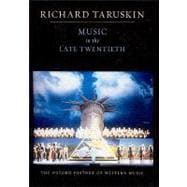
What is included with this book?
| Introduction | p. IX |
| Preface | p. xix |
| Starting from Scratch | p. 1 |
| Music in the Aftermath of World War II; Zhdanovshchina, Darmstadt | |
| A new age | |
| Cold war | |
| Denunciation and contrition | |
| Breaking ranks | |
| Zero hour | |
| Polarization | |
| Darmstadt | |
| Fixations | |
| "Total serialism" | |
| Disquieting questions | |
| Disquieting answers | |
| Solace in ritual | |
| Poster boy | |
| Indeterminacy | p. 55 |
| Cage and the "New York School" | |
| Means and ends | |
| Whose liberation? | |
| Neplus ultra (going as far as you can go) | |
| Purification and its discontents | |
| Permission | |
| Music and politics revisited | |
| Internalized conflict | |
| Conflicts denied | |
| New notations | |
| Preserving the sacrosanct | |
| The Apex | p. 103 |
| Babbitt and Cold War Serialism | |
| Conversions | |
| "Mainstream" dodecaphony | |
| The grand prize | |
| The path to the new/old music | |
| Requiem for a heavyweight | |
| Academicism, American style | |
| An integrated musical time/space | |
| Full realization | |
| Another cold war | |
| Logical positivism | |
| The new patronage and its fruits | |
| Elites and their discontents | |
| Life within the enclave | |
| But can you hear it? | |
| Ultimate realization or reductio ad absurdum? | |
| The Third Revolution | p. 175 |
| Music and Electronic Media; Varese's Career | |
| Tape | |
| An old dream come true | |
| Generating synthetic sounds | |
| A maximalist out of season | |
| "Real" vs. "pure" | |
| The new technology spreads | |
| The big science phase | |
| A happy ending | |
| Big questions reopened | |
| Reciprocity | |
| Renaissance or co-option? | |
| Standoff (I) | p. 221 |
| Music in Society: Britten | |
| History or society? | |
| Some facts and figures | |
| A modern hero | |
| Social themes and leitmotives | |
| Allegory (but of what?) | |
| Exotic/erotic | |
| To serve by challenging | |
| Standoff (II) | p. 261 |
| Music in History: Carter | |
| Explain nothing | |
| From populism to problem-solving: An American career | |
| Theory: The Time Screen | |
| Practice: The First Quartet | |
| Reception | |
| A wholly disinterested art? | |
| At the pinnacle | |
| The Sixties | p. 307 |
| Changing Patterns of Consumption and the Challenge of Pop | |
| What were they? | |
| The music of youth | |
| The British "invasion" | |
| Defection oRock'n'roll becomes rock | |
| Fusion | |
| Integration without prejudice? | |
| Radical chic | |
| A Harmonious Avant-Garde? | p. 351 |
| Minimalism: Young, Riley, Reich, Glass; Their European Emulators | |
| New sites of innovation | |
| Legendary beginnings | |
| Music as spiritual discipline | |
| A contradiction in terms? | |
| "Classical" minimalism | |
| Secrets of structure | |
| "All music is folk music" | |
| A postmodernist masterwork? | |
| "Crossover"; Who's on top? | |
| Disco at the Met | |
| Americanization | |
| Closing the spiritual circle | |
| After Everything | p. 411 |
| Postmodernism: Rochberg, Crumb, Lerdahl, Schnittke | |
| Postmodernism? | |
| Its beginnings for music | |
| A parenthesis on collage | |
| Collage as theater | |
| Apostasy | |
| Esthetics of pastiche | |
| Accessibility | |
| Cognitive constraints? | |
| Where to go from here? | |
| One proposal | |
| The end of Soviet music | |
| Polystylistics | |
| Millennium's End | p. 473 |
| The Advent of Postliteracy: Partch, Monk, Anderson, Zorn; New Patterns of Patronage | |
| Grand old men | |
| Terminal complexity | |
| "Big science" eclipsed | |
| Twentieth-century "orality" | |
| Hobo origins | |
| Imaginary folklore | |
| A feminine redoubt | |
| Music and computers | |
| The elite phase | |
| Spectralism | |
| "Then along came Midi!" | |
| First fruits | |
| Modernists in postmodernist clothing? | |
| A glimpse of the future? | |
| Back to nature | |
| Paying the piper, calling the tune | |
| A new topicality | |
| A new spirituality | |
| Notes | p. 529 |
| Art Credits | p. 555 |
| Further Reading | p. 559 |
| Index | p. 569 |
| Table of Contents provided by Ingram. All Rights Reserved. |
The New copy of this book will include any supplemental materials advertised. Please check the title of the book to determine if it should include any access cards, study guides, lab manuals, CDs, etc.
The Used, Rental and eBook copies of this book are not guaranteed to include any supplemental materials. Typically, only the book itself is included. This is true even if the title states it includes any access cards, study guides, lab manuals, CDs, etc.